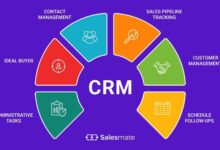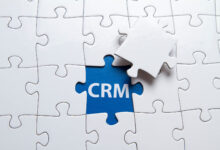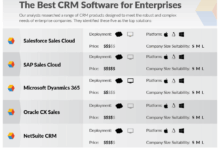Top Cloud-Based CRM Platforms
Top Cloud-Based CRM Platforms are revolutionizing how businesses manage customer relationships. This exploration delves into the leading platforms, comparing their features, pricing, and overall effectiveness. We’ll examine the benefits of cloud-based solutions over traditional on-premise systems and discuss crucial considerations like security, scalability, and integration capabilities. Understanding these aspects is vital for businesses seeking to optimize their customer interactions and drive growth.
From sales automation to customer service support, we’ll dissect the key functionalities offered by prominent players in the market. This detailed analysis aims to provide a comprehensive understanding, enabling informed decision-making for businesses of all sizes seeking to leverage the power of cloud-based CRM.
Introduction to Cloud-Based CRM Platforms
Cloud-based Customer Relationship Management (CRM) systems have revolutionized how businesses manage interactions with customers and prospects. They offer a flexible and scalable solution compared to traditional on-premise systems, allowing companies of all sizes to streamline their operations and improve customer relationships.
Cloud-based CRM refers to a software application that is hosted on the internet, rather than on a company’s own servers. This means that users can access the CRM system from anywhere with an internet connection, using a web browser or a mobile app. Data is stored and managed by the CRM provider, eliminating the need for in-house IT infrastructure and maintenance.
Key Benefits of Cloud-Based CRM Systems
Cloud-based CRMs offer several advantages over on-premise solutions. These benefits contribute significantly to increased efficiency, reduced costs, and improved customer engagement. The most significant advantages include reduced IT infrastructure costs, enhanced accessibility, automatic updates and improved scalability and flexibility.
- Reduced IT Infrastructure Costs: Companies avoid the significant upfront investment in servers, software licenses, and IT personnel required for on-premise systems. The cloud provider handles all hardware and software maintenance.
- Enhanced Accessibility: Employees can access the CRM system from anywhere with an internet connection, using various devices (laptops, desktops, tablets, smartphones), promoting collaboration and responsiveness.
- Automatic Updates: Cloud-based CRMs are automatically updated with the latest features and security patches, eliminating the need for manual updates and minimizing downtime.
- Improved Scalability and Flexibility: Cloud-based systems can easily scale up or down to meet changing business needs, accommodating growth without significant investment in additional infrastructure.
Types of Businesses Benefiting from Cloud CRM
Cloud-based CRM systems are beneficial for a wide range of businesses, regardless of size or industry. The flexibility and scalability of these systems make them particularly well-suited to various business models.
- Small and Medium-sized Enterprises (SMEs): Cloud CRMs provide cost-effective solutions for managing customer relationships, enabling SMEs to compete with larger companies.
- Large Enterprises: Cloud CRMs offer the scalability and flexibility needed to manage large customer bases and complex sales processes across multiple departments and locations.
- Sales-driven Businesses: These businesses benefit from the sales force automation features of cloud CRMs, improving sales team productivity and tracking sales performance.
- Customer Service-focused Businesses: Cloud CRMs help manage customer interactions, track service requests, and improve response times, leading to enhanced customer satisfaction.
Comparison of Cloud CRM Deployment Models
Choosing the right deployment model is crucial for aligning with specific business needs and security requirements. The three primary models – public, private, and hybrid – each offer distinct advantages and disadvantages.
| Feature | Public Cloud | Private Cloud | Hybrid Cloud |
|---|---|---|---|
| Cost | Generally lower upfront costs | Higher upfront costs, but potentially lower long-term costs | Moderate costs, balancing the benefits of both models |
| Security | Shared responsibility model; security relies on the provider and user configurations | Greater control over security and data; enhanced compliance | Enhanced security through segmentation and control, combining the strengths of both models |
| Scalability | Highly scalable, easily adaptable to changing needs | Scalability depends on the infrastructure setup | Scalability varies depending on the balance between public and private components |
| Customization | Limited customization options | High degree of customization | Customization options depend on the specific setup |
Top Cloud-Based CRM Platforms
Choosing the right cloud-based CRM platform is crucial for businesses of all sizes. This section provides a comparative overview of five leading platforms, examining their pricing, user interface, and key features. Understanding these differences will help you make an informed decision based on your specific needs and budget.
Leading Cloud-Based CRM Platforms
Five leading cloud-based CRM platforms are Salesforce Sales Cloud, HubSpot CRM, Zoho CRM, Microsoft Dynamics 365, and Pipedrive. These platforms cater to diverse business needs and offer varying levels of functionality and complexity.
Pricing Models of Leading CRM Platforms
Each platform employs a different pricing model, impacting overall cost. Salesforce Sales Cloud typically uses a subscription-based model with tiered pricing dependent on the number of users and features required. HubSpot CRM offers a freemium model, providing a basic version for free with paid options for advanced features. Zoho CRM also offers a range of subscription tiers, scaling from basic to enterprise-level solutions. Microsoft Dynamics 365 utilizes a subscription model with varying packages based on functionalities and user count. Pipedrive primarily uses a subscription model with different pricing plans tailored to user numbers and required features. It’s important to note that pricing can change, and it’s recommended to check each platform’s website for the most up-to-date information.
User Interface and User Experience (UI/UX) of Leading CRM Platforms
The UI/UX significantly impacts user adoption and productivity. Salesforce Sales Cloud, while powerful, can have a steeper learning curve due to its extensive feature set and complex interface. HubSpot CRM is known for its intuitive and user-friendly interface, making it accessible to users with varying levels of technical expertise. Zoho CRM offers a clean and customizable interface, allowing users to tailor the platform to their specific needs. Microsoft Dynamics 365 provides a robust and adaptable interface, often integrated with other Microsoft products, offering a seamless workflow for Microsoft users. Pipedrive emphasizes simplicity and ease of use, with a clean and straightforward interface focused on sales pipeline management. The best UI/UX will depend on individual preferences and the level of technical expertise within a team.
Comparison of Key Features
The following table compares key features across the five platforms:
| Feature | Salesforce Sales Cloud | HubSpot CRM | Zoho CRM | Microsoft Dynamics 365 | Pipedrive |
|---|---|---|---|---|---|
| Sales Automation | Extensive features, including lead management, opportunity tracking, and forecasting | Robust sales automation tools, including contact management and deal tracking | Comprehensive sales automation capabilities, with features like lead scoring and sales pipeline management | Advanced sales automation, integrated with other Microsoft products | Strong focus on sales pipeline management and deal closing |
| Marketing Automation | Integrated marketing automation capabilities, including email marketing and campaign management | Extensive marketing automation features, including email marketing, social media management, and landing page creation | Good marketing automation features, with email marketing and campaign tracking | Integrated marketing automation capabilities, leveraging Microsoft’s ecosystem | Limited marketing automation features, often requiring integration with other tools |
| Customer Service Features | Comprehensive customer service features, including case management and knowledge base | Growing customer service capabilities, including ticketing and live chat | Solid customer service features, including case management and self-service portals | Robust customer service capabilities, integrated with other Microsoft products | Basic customer service features, often requiring integration with other tools |
| Reporting and Analytics | Advanced reporting and analytics capabilities, providing detailed insights into sales performance | User-friendly reporting and analytics dashboards, providing key performance indicators | Good reporting and analytics features, providing customizable dashboards | Advanced reporting and analytics, integrated with Microsoft Power BI | Clear and concise reporting focused on sales pipeline metrics |
Specific Feature Deep Dives
This section delves into the sales and marketing automation capabilities of leading cloud-based CRM platforms, focusing on Salesforce Sales Cloud and HubSpot, and comparing their lead management features with three other prominent platforms. Understanding these features is crucial for businesses aiming to streamline their processes and improve efficiency.
Salesforce Sales Cloud Sales Automation Capabilities
Salesforce Sales Cloud offers a robust suite of sales automation tools designed to enhance sales productivity and improve sales performance. Key features include lead and opportunity management, contact management, sales forecasting, and reporting. Sales automation within Salesforce streamlines repetitive tasks, allowing sales representatives to focus on higher-value activities like building relationships and closing deals. For instance, automated email sequences can nurture leads, while automated task assignments ensure timely follow-up. Salesforce’s integration with other applications further extends its automation capabilities, allowing for seamless data flow and enhanced operational efficiency. Advanced features like Einstein AI provide predictive insights to optimize sales strategies and improve forecasting accuracy.
HubSpot Marketing Automation Features
HubSpot’s marketing automation capabilities are centered around lead nurturing, campaign management, and performance tracking. It allows businesses to create automated workflows that nurture leads through various stages of the sales funnel, from initial contact to conversion. This includes automated email sequences, personalized content delivery, and social media engagement. HubSpot’s robust analytics dashboard provides comprehensive insights into marketing campaign performance, allowing businesses to optimize their strategies based on real-time data. The platform also offers features for A/B testing, allowing marketers to refine their messaging and improve conversion rates. Integration with other HubSpot tools, such as the CRM and sales hub, ensures a cohesive and efficient marketing and sales process.
Comparative Analysis of Lead Management Tools
Five leading cloud-based CRM platforms – Salesforce Sales Cloud, HubSpot, Microsoft Dynamics 365, Zoho CRM, and SAP CRM – offer distinct approaches to lead management. While all platforms provide basic lead capture and qualification features, their advanced capabilities vary. Salesforce Sales Cloud and HubSpot excel in lead scoring and nurturing, leveraging AI-powered insights. Microsoft Dynamics 365 offers strong integration with other Microsoft products, streamlining workflows for businesses already using the Microsoft ecosystem. Zoho CRM provides a cost-effective solution with a comprehensive set of features, while SAP CRM caters to large enterprises with complex requirements. The optimal choice depends on a company’s size, budget, and specific business needs. A direct comparison of features like lead scoring algorithms, automation capabilities, and reporting dashboards would reveal nuanced differences in their lead management effectiveness.
Benefits of Integrated Sales and Marketing Automation
The integration of sales and marketing automation offers several key benefits:
- Improved Lead Nurturing: Automated workflows ensure consistent communication and engagement with leads throughout the sales funnel.
- Increased Sales Efficiency: Automation of repetitive tasks frees up sales representatives to focus on building relationships and closing deals.
- Enhanced Lead Qualification: Data-driven insights allow for more effective lead prioritization and qualification.
- Better Sales Forecasting: Real-time data and predictive analytics provide more accurate sales forecasts.
- Improved Customer Experience: Personalized communication and timely follow-up enhance customer satisfaction.
- Increased Revenue Generation: Streamlined processes and improved efficiency contribute to higher revenue generation.
Customer Service & Support Capabilities
Effective customer service is paramount for any business, and choosing a CRM platform with robust support features is crucial for maintaining customer satisfaction and loyalty. A strong CRM system streamlines interactions, improves response times, and provides valuable insights into customer needs. This section will explore the customer service capabilities of various top cloud-based CRM platforms.
Zendesk’s Customer Service Features
Zendesk offers a comprehensive suite of customer service tools designed to manage interactions across multiple channels. Its features include ticketing systems for organizing and prioritizing support requests, live chat for immediate assistance, and knowledge bases to empower customers to self-serve. Zendesk also integrates with other tools to create a unified customer support experience. For example, its integration with email allows agents to directly manage customer inquiries within the Zendesk platform, enhancing efficiency and tracking. The platform’s analytics dashboards provide detailed reports on key metrics like resolution time, customer satisfaction (CSAT), and agent performance, enabling businesses to identify areas for improvement.
Customer Support Ticket and Case Management Across Platforms
Different platforms handle customer support tickets and case management in varying ways, but most share core functionalities. Common features include assigning tickets to specific agents, setting priorities based on urgency and customer importance, and tracking the status of each ticket through its lifecycle (e.g., new, in progress, resolved). Some platforms offer advanced features such as automated routing based on keywords or customer segments, and collaborative tools for multiple agents to work on a single case. For instance, Salesforce Service Cloud allows for complex case routing based on predefined rules and customer profiles, enabling quicker resolution. Others, like HubSpot Service Hub, focus on integrating support with marketing and sales to provide a holistic view of the customer journey.
Comparative Analysis of Customer Service Reporting and Analytics Dashboards
Reporting and analytics dashboards are essential for understanding customer service performance. Most platforms provide customizable dashboards that track key metrics such as first response time, resolution time, customer satisfaction (CSAT) scores, and ticket volume. Advanced platforms offer more granular reporting capabilities, allowing businesses to segment data by various factors such as agent, channel, or customer segment. For example, a platform might show that email support has a longer average resolution time than live chat, highlighting an area needing attention. These dashboards allow for data-driven decision-making, enabling businesses to optimize their support processes and improve customer experience.
Customer Support Channels Offered by Different Platforms
The following table illustrates the various customer support channels offered by popular cloud-based CRM platforms. Note that specific features and channel availability may vary depending on the chosen plan and configuration.
| Platform | Phone | Chat | Social Media | |
|---|---|---|---|---|
| Salesforce Service Cloud | Yes | Yes (often requires integration) | Yes | Yes (often requires integration) |
| Zendesk | Yes | Yes (often requires integration) | Yes | Yes (often requires integration) |
| HubSpot Service Hub | Yes | Yes (often requires integration) | Yes | Yes (often requires integration) |
| Microsoft Dynamics 365 Customer Service | Yes | Yes (often requires integration) | Yes | Yes (often requires integration) |
Integration and API Capabilities
Seamless integration with other business tools is crucial for maximizing the efficiency and value of any CRM platform. A robust API (Application Programming Interface) is the key to unlocking this potential, allowing for customized workflows and extensions beyond the standard features. This section will explore the integration capabilities of leading cloud-based CRM platforms, highlighting their API functionalities and the benefits they offer businesses.
The integration capabilities of top cloud-based CRM platforms vary, but generally fall into two categories: pre-built integrations and custom integrations via APIs. Pre-built integrations offer streamlined connections to popular applications, often requiring minimal setup. Custom integrations, enabled by APIs, provide greater flexibility to tailor the CRM to specific business needs. The strength of a platform’s API significantly impacts its adaptability and long-term value.
Pre-built Integrations
Many leading CRM platforms offer a wide range of pre-built integrations with commonly used business applications. These integrations simplify the process of connecting the CRM to other software, eliminating the need for custom development in many cases. Examples include integrations with email marketing platforms like Mailchimp and Constant Contact, allowing for automated email campaigns based on CRM data; accounting software such as QuickBooks and Xero, facilitating streamlined financial reporting and invoice management; and marketing automation platforms like HubSpot and Marketo, enabling comprehensive marketing campaign tracking and lead nurturing. The availability and ease of use of these pre-built integrations are important factors to consider when selecting a CRM platform.
API Capabilities and Custom Functionality
APIs act as bridges, allowing different software applications to communicate and exchange data. A well-documented API allows developers to build custom applications and integrations that extend the CRM’s functionality beyond its built-in features. This allows businesses to create tailored solutions addressing their unique needs, such as integrating with legacy systems or building custom dashboards and reporting tools. For example, a company might use its CRM’s API to create a custom integration with its manufacturing system, providing real-time updates on inventory levels and order fulfillment. Another example could be a custom integration with a project management tool to track customer projects directly within the CRM.
Importance of API Documentation and Developer Support
Comprehensive API documentation is essential for developers to effectively utilize a platform’s API. Clear and well-organized documentation reduces development time and minimizes errors. This includes detailed descriptions of API endpoints, request parameters, and response formats, along with code samples and examples. Equally important is the availability of robust developer support, including forums, knowledge bases, and direct access to technical experts. This support is crucial for troubleshooting issues and ensuring successful integration. Platforms with strong developer communities often provide faster resolution times and a wealth of shared knowledge, further facilitating custom development.
Security and Data Privacy Considerations
Choosing a cloud-based CRM involves a significant trust in the vendor to protect your sensitive business data. Robust security measures and adherence to data privacy regulations are paramount. This section explores best practices, relevant regulations, and the security features offered by leading CRM platforms.
Security best practices for cloud-based CRM data encompass a multi-layered approach, combining technological safeguards with strong organizational policies. Effective data security requires a proactive strategy that considers both internal and external threats. This includes regular security audits, employee training on data handling procedures, and the implementation of robust access control mechanisms. Failure to address these aspects can lead to significant data breaches and reputational damage.
Data Privacy Regulations and Compliance Certifications
Cloud CRM platforms must comply with various data privacy regulations depending on the location of the data and the users involved. Key regulations include the General Data Protection Regulation (GDPR) in Europe, the California Consumer Privacy Act (CCPA) in California, and other similar laws globally. Vendors should hold relevant certifications, such as ISO 27001 (information security management) and SOC 2 (security, availability, processing integrity, confidentiality, and privacy), to demonstrate their commitment to data security and compliance. Businesses should verify that their chosen CRM provider actively maintains these certifications and complies with all applicable regulations for their specific operating regions.
Security Features Offered by Leading CRM Platforms
Many leading cloud-based CRM platforms offer a range of security features. These typically include data encryption both in transit (using HTTPS) and at rest (using robust encryption algorithms), multi-factor authentication (MFA) to prevent unauthorized access, granular access controls allowing administrators to define user permissions based on roles and responsibilities, and regular security audits and penetration testing to identify and address vulnerabilities. Specific features vary between platforms, so thorough due diligence is essential. For example, Salesforce offers robust encryption, access controls, and a comprehensive security posture, while Zoho CRM provides similar features with a focus on compliance certifications.
Questions Businesses Should Ask Vendors About Data Security
Before selecting a cloud-based CRM, businesses should thoroughly investigate the vendor’s security practices. This requires asking specific questions to assess the adequacy of their security posture.
- What data encryption methods are used, both in transit and at rest?
- What access control mechanisms are in place, and how granular are they?
- What security certifications does the vendor hold (e.g., ISO 27001, SOC 2, GDPR compliance)?
- What incident response plan does the vendor have in place in case of a data breach?
- What measures are taken to protect against phishing attacks and other social engineering threats?
- How frequently are security audits and penetration testing conducted?
- What data residency options are available, and where is my data stored?
- What is the vendor’s policy on data retention and deletion?
- What level of support is provided in case of security incidents?
- How does the vendor comply with relevant data privacy regulations (e.g., GDPR, CCPA)?
Scalability and Customization Options
Cloud-based CRMs offer significant advantages in terms of scalability and customization, allowing businesses of all sizes to adapt their systems to evolving needs and growth trajectories. This adaptability is a key factor in their widespread adoption across diverse industries. The flexibility inherent in these systems translates directly into improved efficiency and a more streamlined workflow.
The inherent scalability of cloud-based CRMs allows them to seamlessly accommodate business growth. Unlike on-premise solutions that require significant upfront investment and often involve complex upgrades, cloud-based systems can easily scale resources up or down based on demand. This means businesses can add users, storage, and processing power as needed, without the need for extensive IT infrastructure investments or disruptive system overhauls. This pay-as-you-go model provides cost-effectiveness and flexibility, especially beneficial for startups and rapidly expanding companies.
Scalability in Cloud-Based CRMs
Cloud-based CRMs leverage the elasticity of cloud computing infrastructure. This means that the CRM system can dynamically adjust its resource allocation to meet fluctuating demands. For example, a business experiencing a surge in sales leads can automatically scale up its processing power to handle the increased workload without experiencing performance degradation. Conversely, during periods of lower activity, resources can be scaled down, optimizing costs. This dynamic scaling ensures consistent performance and responsiveness regardless of the volume of data or user activity. Major cloud providers like AWS, Azure, and Google Cloud offer robust infrastructure to support this scalability, ensuring high availability and redundancy.
Customization Options for Tailoring CRMs
Cloud-based CRMs typically offer a range of customization options to align the system with specific business needs. These options can range from simple configuration changes, such as modifying field labels and layouts, to more complex customizations involving custom workflows, integrations, and even the development of custom applications. Many platforms provide a user-friendly interface for basic customization, enabling business users to make adjustments without needing extensive technical expertise. For more advanced customizations, businesses can leverage APIs and SDKs to integrate the CRM with other systems or build custom applications tailored to their specific requirements.
Adapting CRMs to Evolving Requirements
Businesses frequently adapt their CRM systems to reflect changes in their operations, market conditions, and strategic goals. For instance, a company launching a new product line might customize its CRM to track specific product-related data, such as sales performance and customer feedback. Similarly, a company expanding into a new geographical market might customize its CRM to support multiple languages and currencies. This adaptability is crucial for maintaining the CRM’s relevance and effectiveness as the business evolves. The flexibility offered by cloud-based CRMs makes such adaptations relatively straightforward and cost-effective compared to on-premise solutions.
Impact of Customization on User Experience and Productivity
Effective customization significantly enhances user experience and boosts productivity. When a CRM system is tailored to reflect the specific workflows and data requirements of a business, users can access the information they need quickly and efficiently. This reduces the time spent searching for data and navigating complex interfaces, leading to improved productivity and reduced errors. Furthermore, a well-customized CRM can streamline business processes, automate repetitive tasks, and improve collaboration among team members. A CRM that is intuitive and easy to use results in higher user adoption rates, maximizing the return on investment. For example, a sales team using a CRM customized with their specific sales process will experience improved efficiency and better lead management.
Last Word
Ultimately, selecting the right cloud-based CRM platform hinges on aligning its capabilities with your specific business needs and objectives. Careful consideration of factors like pricing, scalability, integration options, and security protocols is paramount. This exploration has provided a framework for evaluating leading platforms, empowering businesses to make strategic choices that foster improved customer relationships and drive sustainable growth. By understanding the nuances of each platform, you can confidently select the solution that best supports your journey towards customer-centric excellence.





